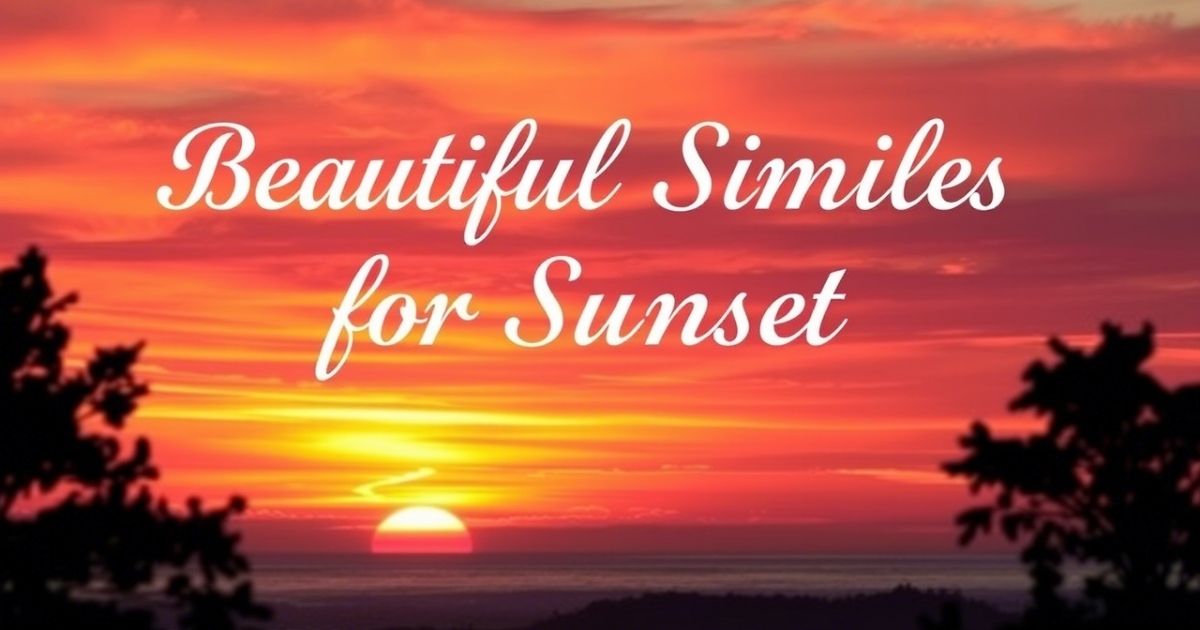Similes for Sunset are a beautiful way to describe the stunning end of the day. Using similes allows us to compare sunsets to familiar images, making them easier to imagine. From the glowing similes for sunset to the soft colors in the sky, they help paint a vivid picture. Many people enjoy the calming beauty of sunsets and similes capture that feeling perfectly. The colors of sunset often remind us of a painting in the sky or a glowing ember fading away.
When we think about similes for sunset, we can picture the sun as a dying star or a warrior’s flame. These comparisons bring out the emotional warmth of the moment. Similes for sunset add depth and meaning to sunset descriptions. They reflect the transition of day to night and the peaceful closure of the day. Whether it’s a peacock’s feathers or a final note in a symphony, similes for sunset make the experience unforgettable.
What is a Simile for Sunset?
A simile for sunset is a way to compare the sunset to something familiar, helping us understand its beauty. By using simple comparisons, writers can describe the colors and feelings of the sky. For example, a sunset might be compared to a glowing ember or a fiery painting in the sky.
These comparisons make the description more vivid and emotional. They allow readers to picture the sunset in their minds, making it come to life. Similes help capture the fleeting moment of the day turning to night.
Through these comparisons, sunsets are transformed into powerful symbols. They represent transitions and beauty, making them unforgettable.
Why Use Similes for Sunset?
Using comparisons for sunsets enhances the description, making it more vivid and relatable. By comparing the sky to familiar images, like “a dying ember” or “molten gold,” readers can easily visualize the scene. These comparisons capture the beauty and emotion of the moment.
They also create a stronger connection with the reader. When we read that the sunset is like “a warrior’s flame,” it evokes feelings of power and warmth. This emotional depth adds meaning to the scene, making it unforgettable.
In storytelling and poetry, such descriptions add richness and symbolism. They not only describe what we see but also express deeper meanings, like the transition of day into night or the end of a journey.
A Personal Reflection: Watching the Sunset

Watching the sunset always brings a sense of peace. As the sky changes colors, I feel connected to something larger than myself. The warm hues of orange, pink, and purple seem to whisper a quiet message about the beauty of nature. Each evening feels like a unique moment, full of calm and reflection.
The fading light has a way of making me pause and appreciate the present. It’s as if the world slows down for a few minutes. As the sun sinks lower, I’m reminded that each day is a new opportunity, full of promise and potential.
When the sky finally darkens, I feel a sense of completion. It’s like the closing of a book, leaving behind a feeling of fulfillment. Watching the sunset is more than just a visual experience; it’s a time for personal reflection and inner peace.
The Cultural and Historical Significance of Sunsets
Sunsets have held deep cultural and historical meanings throughout time. Many societies see them as symbolic of transitions, marking the end of the day or representing the journey of life. From mythology to art, sunsets have inspired various forms of expression, providing rich metaphors for endings, renewal, and even the cycle of life.
- In Ancient Mythology: Many cultures viewed sunsets as symbolic of endings or transitions. For example, the ancient Greeks associated sunsets with the sun god Helios descending into the underworld.
- In Native American Culture: Sunsets often represented a time for reflection and spiritual connection with ancestors, seen as a bridge between the earthly and spiritual realms.
- In Ancient Egypt: Sunsets symbolized the journey of the sun god Ra as he traveled through the underworld each night.
- In Japanese Tradition: The beauty of the setting sun is often captured in haiku, symbolizing fleeting moments and the passage of time.
- In Literature: Writers like Lord Byron and John Keats often used sunsets as metaphors for beauty, despair or renewal in their poetry.
- In Modern Culture: Sunsets are still cherished as symbols of peace, offering a moment to pause, reflect and appreciate the day’s end.
Related Guide:
Powerful Metaphors for Popular Concepts
41 Similes for Sunset: Meaning with Examples

- The sunset was like molten gold.
Meaning: The sunset’s glow is compared to melted gold, suggesting warmth and fluid beauty.
Example: “The sky melted into molten gold as the sun set.” - The sunset was like a warrior’s flame.
Meaning: The intensity and fierceness of the sunset are likened to the burning spirit of a warrior.
Example: “The sunset blazed like a warrior’s flame, fierce and bold.” - The sunset was like a dying ember.
Meaning: The fading light of the sunset is compared to the last glow of a fire.
Example: “As the day ended, the sunset dimmed like a dying ember.” - The sunset was like fire on the water.
Meaning: The reflection of the sunset on water is compared to a fire, adding a dramatic, fiery effect.
Example: “The sunset turned the lake into fire on the water.” - The sunset was like a golden crown.
Meaning: The sunset is likened to a radiant crown, suggesting majesty and brilliance.
Example: “The sun lowered, leaving behind a golden crown on the horizon.” - The sunset was like a painting in the sky.
Meaning: The colors of the sunset are compared to the brushstrokes of a painting.
Example: “The sunset appeared as a masterpiece, a painting in the sky.” - The sunset was like spilled wine.
Meaning: The fading light of the sunset is compared to wine poured across the horizon.
Example: “The sky looked like spilled wine, with deep red hues spreading everywhere.” - The sunset was like a peacock’s feathers.
Meaning: The colors of the sunset resemble the rich, vibrant hues of a peacock’s feathers.
Example: “The sky burst into reds and oranges like a peacock’s feathers.” - The sunset was like the final page of a book.
Meaning: The sunset marks the end of the day, like the last page of a story.
Example: “As the sun set, it felt like turning the final page of a book.” - The sunset was like a fading dream.
Meaning: The beauty of the sunset is compared to a dream that slowly fades.
Example: “The sunset was a fading dream, slipping quietly into night.” - The sunset was like a glowing ember.
Meaning: The warm glow of the sunset is compared to the final embers of a fire.
Example: “The sunset glowed like a burning ember, flickering and soft.” - The sunset was like a blushing sky.
Meaning: The sky’s pink and red tones during sunset are compared to a person’s blush.
Example: “The sky blushed in shades of pink and red as the sun dipped below the horizon.” - The sunset was like fireworks in the sky.
Meaning: The colors of the sunset explode in the sky like a colorful firework show.
Example: “The sunset lit up the sky, like fireworks bursting at night.” - The sunset was like the soft whispering wind.
Meaning: The gentle nature of the sunset is compared to the calm and soft sound of wind.
Example: “The sunset came quietly, like the soft whispering wind.” - The sunset was like the final note of a symphony.
Meaning: The sunset is compared to a perfect, concluding note in a beautiful symphony.
Example: “The sunset felt like the final, perfect note in a symphony.” - The sunset was like a sinking ship.
Meaning: The sunset’s gradual disappearance is compared to a ship sinking into the sea.
Example: “The sun sank like a ship going down into the ocean.” - The sunset was like a burning heart.
Meaning: The deep colors of the sunset are compared to the warmth and passion of a heart on fire.
Example: “The sunset burned like a heart in love, full of intense color.” - The sunset was like a dying star.
Meaning: The fading light of the sunset is compared to the death of a star.
Example: “The sun set slowly, like a dying star losing its light.” - The sunset was like a golden field of wheat.
Meaning: The sun’s warm glow is compared to the golden color of a ripened wheat field.
Example: “The sunset spread across the sky like a golden field of wheat.” - The sunset was like a bright jewel in the sky.
Meaning: The brilliance of the sunset is compared to a glowing jewel.
Example: “The sunset sparkled like a jewel, bright against the darkening sky.” - The sunset was like a vibrant festival.
Meaning: The lively and colorful sunset is compared to the energy of a festival.
Example: “The sky was alive, like a vibrant festival bursting with color.” - The sunset was like a fire turning to ash.
Meaning: The sunset’s bright light fades away, like a fire burning out.
Example: “The sky glowed like fire turning to ash, slowly dimming.” - The sunset was like a fading rainbow.
Meaning: The sunset’s colors disappear slowly, similar to a rainbow that fades.
Example: “The sky faded like a rainbow losing its color.” - The sunset was like the closing curtain of a play.
Meaning: The sunset marks the end of the day, like the final act of a performance.
Example: “As the sun set, it was like the closing curtain of a play.” - The sunset was like a golden lantern.
Meaning: The light of the sunset is compared to the glow of a lantern.
Example: “The sun dipped below the horizon, like a golden lantern going out.” - The sunset was like a peaceful lullaby.
Meaning: The calming nature of the sunset is compared to a gentle lullaby.
Example: “The sunset whispered like a peaceful lullaby, soothing the day to rest.” - The sunset was like a fiery phoenix.
Meaning: The sun’s bright, bold colors are compared to the rebirth of a phoenix.
Example: “The sunset rose like a fiery phoenix, filling the sky with color.” - The sunset was like the edge of a canvas.
Meaning: The sunset marks the boundary of the sky, like the edge of a painting.
Example: “The sunset framed the sky like the edge of a canvas.” - The sunset was like a soft blanket.
Meaning: The calming warmth of the sunset is compared to a soft blanket.
Example: “The sunset wrapped the earth in its soft, warm blanket.” - The sunset was like a flame fading in the night.
Meaning: The sunset’s light dimming is compared to a flame dying in the dark.
Example: “The sunset flickered like a flame fading in the night.” - The sunset was like a golden ripple on the sea.
Meaning: The reflection of the sunset on the water is compared to a ripple of light.
Example: “The sunset spread across the sea, like a golden ripple.” - The sunset was like a sparkler on the horizon.
Meaning: The bright, twinkling colors of the sunset are compared to a sparkler’s light.
Example: “The sunset danced like a sparkler, flickering on the horizon.” - The sunset was like a ribbon of fire.
Meaning: The sunset’s colorful bands are compared to a fiery ribbon.
Example: “The sky glowed with ribbons of fire as the sun set.” - The sunset was like the colors of a stained glass window.
Meaning: The rich hues of the sunset are compared to the vibrant colors in stained glass.
Example: “The sunset painted the sky like a stained glass window.” - The sunset was like a soft blush on the earth.
Meaning: The gentle hues of the sunset are compared to a soft, delicate blush.
Example: “The earth blushed with pink and gold as the sun set.” - The sunset was like a dragon’s breath.
Meaning: The intensity of the sunset’s colors is compared to the fiery breath of a dragon.
Example: “The sky blazed like a dragon’s breath, fierce and untamed.” - The sunset was like the crackle of a bonfire.
Meaning: The sunset’s fiery colors are compared to the warmth and sound of a crackling fire.
Example: “The sky crackled with color, like a bonfire on a cold night.” - The sunset was like a butterfly’s wings.
Meaning: The sunset’s fleeting beauty is compared to the delicate wings of a butterfly.
Example: “The sunset fluttered across the sky like butterfly wings.” - The sunset was like a final farewell.
Meaning: The sunset symbolizes the end of the day, like saying goodbye.
Example: “The sunset was a final farewell to the day, fading gently.” - The sunset was like a painting of fire.
Meaning: The colors of the sunset are compared to a painting created with fire.
Example: “The sky was painted with fire as the sun sank lower.” - The sunset was like a final breath before night.
Meaning: The sunset represents the last moment of light before the world turns dark.
Example: “The sunset took its final breath, fading into the night.”
Similes for the Sun

The sun is a powerful symbol in many cultures, often described through vivid comparisons. It can be seen as a fiery ball of light, like a glowing ember or a warrior’s flame. These comparisons highlight the sun’s intense energy and warmth, making it easier to picture in the sky.
Sometimes, the sun is compared to a golden crown, symbolizing its importance and majesty. Other times, it’s like a painting, with its colors stretching across the sky as it sets or rises. Such comparisons evoke a sense of awe and beauty in the natural world.
These comparisons also reflect the sun’s ability to bring light and life. Describing the sun this way helps us connect emotionally with its role in nature, evoking feelings of hope, warmth and energy.
Quiz: Test Your Knowledge of Sunset Similes
Test your knowledge with this fun quiz on sunset comparisons. See how well you can match the descriptions with their meanings. Ready to challenge your understanding of sunset imagery?
- Which simile compares the sunset to liquid metal?
A) The sunset was like molten gold.
B) Like fire on the water.
C) The sun hung like a lantern.
Answer: A - Which comparison describes the sunset as a fiery object?
A) The sun sank like a sinking ship.
B) The sunset was like a warrior’s flame.
C) The sky turned like peacock feathers.
Answer: B - Which simile likens the sunset to a painting?
A) The sunset was a painting in the sky.
B) The sunset was like spilled wine.
C) The sky burned like a bonfire.
Answer: A - Which comparison relates the sunset to a fading object?
A) Like a dying ember.
B) Like a golden crown.
C) Like a final page of a book.
Answer: A - Which simile compares the sunset to an event?
A) The sunset was like a final note of a symphony.
B) The sky blushed like a soft whispering wind.
C) The sunset shimmered like fireworks.
Answer: A - Which comparison describes the sunset as a warm object?
A) The sunset glowed like a hug-like warmth.
B) The sunset faded like a dying star.
C) The sunset burned like fire on the water.
Answer: A - Which simile suggests a beautiful sky color?
A) The sunset was a blushing sky.
B) The sunset hung like a final curtain.
C) The sky melted like molten gold.
Answer: A - Which simile compares the sunset to nature?
A) The sunset was like a peacock’s feather.
B) The sunset was like a fiery warrior’s flame.
C) The sky was like a golden field of wheat.
Answer: C - Which comparison suggests the sunset was a fleeting moment?
A) The sunset was a fading rainbow.
B) The sunset sank like a deep ocean.
C) The sky was like the final page of a book.
Answer: A - Which simile compares the sunset to a play?
A) The sunset was like the closing curtain of a play.
B) The sky was like fireworks turning to ash.
C) The sunset was like a bonfire’s ember.
Answer: A - Which simile links the sunset to a star?
A) The sunset was like a dying star.
B) The sunset was like a golden crown.
C) The sunset was like a sinking ship.
Answer: A - Which comparison describes the sunset as a gradual event?
A) The sunset was like the final page of a book.
B) The sunset was like a slow-moving wave.
C) The sunset faded like a dream.
Answer: A - Which simile compares the sunset to the ocean?
A) The sunset was like the deep ocean.
B) The sunset was like a warrior’s flame.
C) The sunset was like a glowing ember.
Answer: A - Which comparison compares the sunset to a festival?
A) The sunset was like a vibrant festival.
B) The sunset was like a dying fire.
C) The sunset was like a sinking ship.
Answer: A - Which simile relates the sunset to a warm moment?
A) The sunset was like a golden crown.
B) The sunset was like a soft whispering wind.
C) The sunset glowed like bonfire embers.
Answer: C
FAQ’s
What are some examples of sunset comparisons?
Some common similes for sunset include descriptions like “a painting in the sky” or “a glowing ember fading into darkness.”
How do sunset comparisons improve writing?
Similes for sunset bring beautiful imagery to writing, making the description more vivid and emotional, helping readers connect to the sunset experience.
Why are sunset comparisons used in poetry?
Similes for sunset help poets create powerful and evocative imagery, allowing them to convey emotions and the beauty of sunsets in a more relatable way.
What do sunset comparisons symbolize?
Similes for sunset often symbolize transitions, like the end of the day or the passage of time, conveying deeper meanings and connections to life.
How can sunset comparisons enhance storytelling?
By using similes for sunset, storytellers can set moods, enhance scenes and create emotional depth, turning a simple sunset into a vivid, memorable moment.
Conclusion
Similes for sunset are a powerful tool for creating vivid and emotional imagery. They help bring the beauty of the sunset to life, making it easy for readers to imagine the colors and feelings. By using similes for sunset, writers can describe the sky as a “dying ember” or a “final note of a symphony,” which adds depth and meaning to their words.
The use of similes for sunset is not just about the imagery. It’s also about capturing the emotion that sunsets evoke. These comparisons help convey the transition of day to night and the fleeting beauty of nature. Whether it’s the soft whispering wind or the golden crown of the sun, similes for sunset allow us to experience the sunset in a more personal and memorable way.

Atlas Reid is an experienced administrator with 5 years of expertise in managing operations, streamlining processes, and ensuring efficiency. Skilled in leadership, organization, and problem-solving to drive business success.








